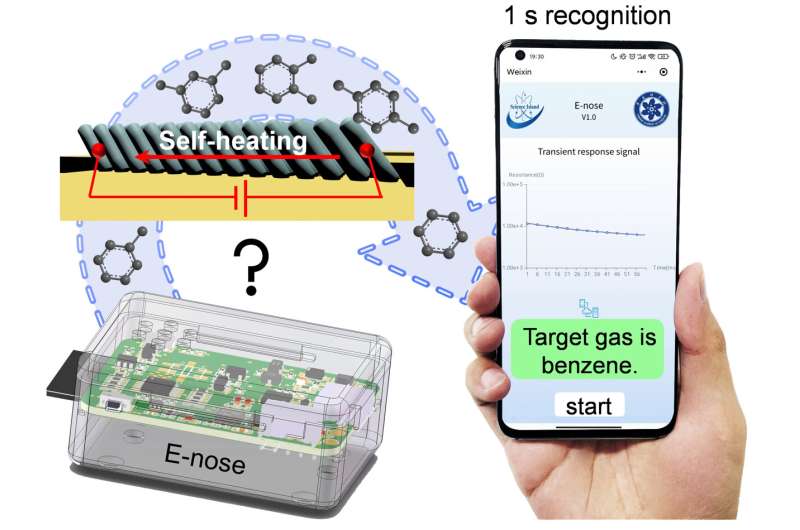
A recent study published in ACS Sensors highlights the development of a smart electronic nose (e-nose) by a research team led by Prof. Meng Gang from the Hefei Institutes of Physical Science of the Chinese Academy of Sciences.
The novel e-nose utilizes a self-heating modulation strategy to accurately distinguish different types of target gas molecules within just one second.
Significant progress has been made in gas molecule detection using e-nose comprised of non-selective semiconductor gas sensors. However, extracting adequate molecular features in a short time (<1 second) remains a major obstacle, which hinders the early warning applications of e-nose for lethal or explosive gases.
In this study, an innovative approach for temperature control and modulation was developed as an alternative to the conventional method using external heaters. A tungsten trioxide (WO3) nanorod film prepared by oblique angle deposition (OAD) was used as both a sensitive sensing layer and a stable self-heating layer. Due to the ultrafast (~20 μs) thermal relaxation time, the OAD WO3 sensor can generate sufficient electrical response features via self-heating temperature modulation.
This advancement has led to the accurate discrimination of 12 gas molecules within 0.5–1 seconds, which is one order faster than the state-of-the-art e-noses.
In addition, a smart wireless e-nose system was developed to enable accurate and instantaneous identification of target gases in ambient air backgrounds.
This development demonstrates the potential applications of the e-nose in homeland security and public health, according to the team.
More information:
Meng Li et al, Prompt Electronic Discrimination of Gas Molecules by Self-Heating Temperature Modulation, ACS Sensors (2023). DOI: 10.1021/acssensors.3c01839
Citation:
Smart e-nose uses self-heating temperature modulation to enable rapid identification of gas molecules (2024, February 19)
retrieved 19 February 2024
from https://phys.org/news/2024-02-smart-nose-temperature-modulation-enable.html
This document is subject to copyright. Apart from any fair dealing for the purpose of private study or research, no
part may be reproduced without the written permission. The content is provided for information purposes only.







